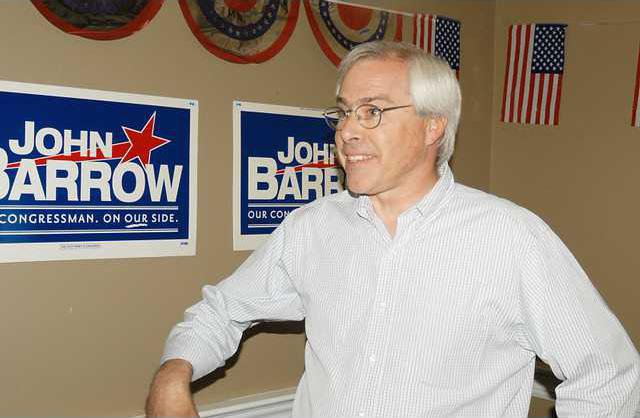SAVANNAH — With nearly a handful of opponents, including one from his own party, wanting his job, John Barrow kicked off his Congressional re-election campaign Saturday afternoon.
Barrow (D-Savannah), the representative for Georgia’s 12th District, faces state Sen. Regina Thomas, another Democrat from Savannah, in July’s primary. The winner will contest the winner of a three-man race for the Republican nomination.
Even with the hurdles — from a primary fight to November’s general election — Barrow is upbeat about his chances for a third term.
“I have the distinction of being the only person who has run for and been elected to this seat,” he said of the field. “I promised to be Georgia’s most accessible Congressman, and I’ve kept my promise.”
By his count, Barrow has held more than 100 town hall meetings in a district that stretches from the western half of Chatham County to Taliaferro County. He estimates he’s traveled 44,000 miles in the last 14-15 months, or about 750 miles a week, all on the weekends or during recesses.
“A lot of folks in these towns say, ‘We’ve never had a Congressman work this hard to spend time with us before,’” Barrow said.
What they’re telling him in his stops is they are concerned about the cost of health care and gas.
“The middle class is getting squeezed,” he said.
Barrow has introduced three measures to widen tax breaks for child care, college education and home ownership and believes all three will pass the House.
“These are tax cuts to sustain and grow the middle class,” he said.
The current tax credit for child care is $600 per child, with up to $1,200 for two children.
“That’s nothing like what the real cost is,” said Barrow, whose bill would double the exemption.
His planned college education tax break would expand it from $3,000 over two years to $12,000 over four years.
Currently, 1 million homeowners aren’t allowed their mortgage interest because their payments are too low. Barrow’s measure would allow them to deduct their interest without having to fill out an itemized return.
“We’ve been saying they don’t have enough to deduct, that they don’t count,” Barrow said. “It seems to me they count even more. They’re the ones who need the help the most.”
Barrow also has sponsored legislation to increase the mileage reimbursement for disabled veterans who have to travel to Veterans Administration medical centers for care and treatment.
“We’ve been nickel and diming the vets for years now, and I think that’s wrong,” he said. “I’ve been a leader in improving benefits for veterans.”
According to Barrow, vets hadn’t gotten an increase in their mileage from 11 cents a rate in 31 years. He put forth a bill to get that raised in the previous Congress, but couldn’t get it to a committee hearing.
In this Congress, he got introduced, through the committee and onto the floor for an up-or-down vote. The reimbursement rate is now 28.5 cents a mile.
“It’s not where it needs to be,” Barrow said, “but it’s a step in the right direction.”
Barrow, who has been endorsed by the U.S. Chamber of Commerce, has a crafted a bill to help small businesses offer more affordable health insurance. The bill, known as the SHOP (small business health options program) Act, was written in conjunction with the National Federation of Independent Businesses.
“It’s going to be the future of small business health insurance reform,” he said. “If you are a small business or self-employed, you are out of luck. You can get (health insurance), but you have to pay through the nose. You have to pay twice as much. We’re going to get that good quality health care on the same level as the big guys get.”
What has happened, Barrow said, is that insurance companies used to take small groups and pool them together to spread out the costs. Now, they’ve broken those groups back into smaller pools, meaning there are fewer participants to help bear the cost.
The bill also addresses pre-existing conditions as a deterrent to health insurance coverage.
“Pre-existing conditions really hit small business people the most,” Barrow said. “It traps them into the current job.”
The legislation also would limit insurance companies from raising rates based on claims history.
“If you have the nerve to file a claim, they’ll get it out of you on the premium,” Barrow said.
The Democrats have a 37-seat edge over the Republicans in the House, gained in 2006’s tumultuous mid-year elections, going into the November vote. Twelve of the 13 seats in Georgia’s current delegation are being contested, and five incumbents face primary fights. Of Georgia’s 13 representatives, seven are Republicans and six are Democrats, and Barrow — a member of the Blue Dog caucus of fiscally conservative Democrats — believes more can be accomplished through a Democratic majority.
“I’ve been doing things,” he said. “I’m part of a team that voted for the largest increase in helping people go to college, the largest single increase in veterans health care. That’s what I’m proud of being able to do as a member of the Blue Dog Democrats.
“I’m now more optimistic about what we are able to do, in spite of the obstacles and the opposition we’ve run into.”








